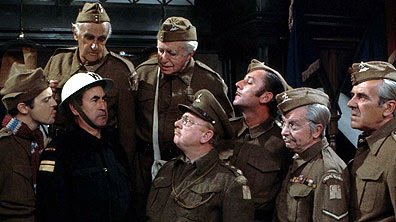Taken from the Guild's weekly e-bulletin. Guild members wanting work to be included should contact Erik in the Guild office.MARTIN ALLEN wrote the episodes of
Coronation Street going out on ITV1 at 7:30pm and at 8:30pm on Friday 1st August.
SONALI BHATTACHARYYA wrote the episodes of
Silver Street, airing from the 21st July to 27th July, and 28th July to 1st August, at 1.30pm every weekday, with a Sunday omnibus at 4.30pm.
TILLY BLACK’S radio play
Sand is going out on Radio 4 at 2:15pm on Friday 1st August.
TONY BURGESS wrote the episode of
The Visit going out on BBC1 at 10:40pm on Wednesday 30th July.
RICHARD BURKE wrote the episode of
Hollyoaks going out on C4 at 6:30pm on Friday 1st August.
DAVID CROFT co-wrote the episode of
Dad’s Army, High Finance, going out on BBC2 at 8:30pm on Saturday 26th July.
ARNOLD EVANS wrote the episode of Doctors,
Hunky Dory, going out on BBC1 at 1:45pm on Monday 28th July.
JONATHAN EVANS wrote the episode of Doctors,
Old Green Eyes, going out on BBC1 at 1:45pm on Friday 1st August.
ADRIAN FLYNN wrote the episodes of
The Archers going out on Radio 4 at 7:00pm from Sunday 27th until Friday 1st August, with each episode being repeated at 2:00pm the day following its original broadcast.
JULIAN FRIEDMANN, editor of ScriptWriter magazine, has now launched it as an online magazine at
www.twelvepoint.com JONATHAN HARVEY wrote the episode of
Coronation Street going out on ITV1 at 7:30pm on Wednesday 30th July.
ANTHONY HOROWITZ wrote the episode of
Foyle’s War, A War Of Nerves, going out on ITV1 at 8:55pm on Saturday 26th July.
STEVE HUGHES wrote the episode of
Emmerdale going out on ITV1 at 7:00pm on Monday 28th July.
MARK ILLIS wrote the episode of
Emmerdale: Risky Business going out on ITV1 at 7:00pm on Tuesday 29th July.
JESSICA LEA wrote the episode of
Hollyoaks going out on C4 at 6:30pm on Tuesday 29th July.
PENNY LEICESTER abridged Jennie Roonie's
Inside the Whale, The Absolute Beginning of Things, going out on Radio 4 at 7:45pm on Monday 28th July.
DOMINIC MINGHELLA co-wrote the episode of
Doc Martin, The Family Way, going out on ITV1 at 9:00pm on Tuesday 29th July.
DEBBIE OATES wrote the episode of
Coronation Street going out on ITV1 at 8:30pm on Monday 28th July.
PHIL REDMOND was recently appointed as Chairman of the
National Museums and Galleries of Liverpool.
PAUL ROUNDELL wrote the episodes of
Emmerdale going out on ITV1 at 7:00pm on Wednesday 30th and Thursday 31st July.
MICHAEL RUSSELL wrote the episode of
Midsomer Murders, The Magician’s Nephew, going out on ITV1 at 8:00pm on Sunday 27th July.
DIANE SAMUELS’ new play, Calais, is part of a programme of six short plays specially commissioned as part of the
Everyword new writing festival at the Liverpool Everyman Theatre on the evening of Saturday 26th July. The play was inspired by the elopement of Mary and Percy Shelley in 1814, accompanied in true free-love fashion by Mary’s stepsister.
A.C.H. SMITH has written the book and lyrics for a new musical,
Doctor Love, with music by David Lyon. Based on Molière’s L’Amour Médecin, its première will be staged at the Tobacco Factory Theatre in Bristol for five nights, July 29th-August 2nd, by an ensemble of 30 performers, musicians and dancers. The MD is Christopher Northam, the stage director and choreographer Vicki Klein.
Barry Stone's story,
The Event Of The Nose, has been published online by Byker Books.
ALAN WHITING wrote the episode of
Kingdom going out on ITV1 at 10:40pm on Tuesday 29th July.


















